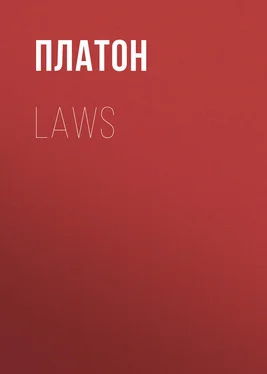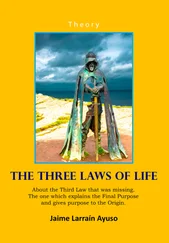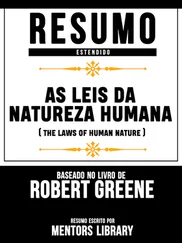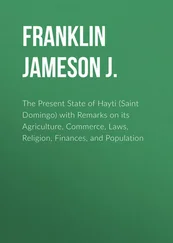Платон - Laws
Здесь есть возможность читать онлайн «Платон - Laws» — ознакомительный отрывок электронной книги совершенно бесплатно, а после прочтения отрывка купить полную версию. В некоторых случаях можно слушать аудио, скачать через торрент в формате fb2 и присутствует краткое содержание. Жанр: Философия, foreign_antique, foreign_prose, на английском языке. Описание произведения, (предисловие) а так же отзывы посетителей доступны на портале библиотеки ЛибКат.
- Название:Laws
- Автор:
- Жанр:
- Год:неизвестен
- ISBN:нет данных
- Рейтинг книги:5 / 5. Голосов: 1
-
Избранное:Добавить в избранное
- Отзывы:
-
Ваша оценка:
- 100
- 1
- 2
- 3
- 4
- 5
Laws: краткое содержание, описание и аннотация
Предлагаем к чтению аннотацию, описание, краткое содержание или предисловие (зависит от того, что написал сам автор книги «Laws»). Если вы не нашли необходимую информацию о книге — напишите в комментариях, мы постараемся отыскать её.
Laws — читать онлайн ознакомительный отрывок
Ниже представлен текст книги, разбитый по страницам. Система сохранения места последней прочитанной страницы, позволяет с удобством читать онлайн бесплатно книгу «Laws», без необходимости каждый раз заново искать на чём Вы остановились. Поставьте закладку, и сможете в любой момент перейти на страницу, на которой закончили чтение.
Интервал:
Закладка:
And now, has our discussion been of any use? 'Yes, stranger; for by a singular coincidence the Cretans are about to send out a colony, of which the settlement has been confided to the Cnosians. Ten commissioners, of whom I am one, are to give laws to the colonists, and we may give any which we please – Cretan or foreign. And therefore let us make a selection from what has been said, and then proceed with the construction of the state.' Very good: I am quite at your service. 'And I too,' says Megillus.
BOOK IV. And now, what is this city? I do not want to know what is to be the name of the place (for some accident, – a river or a local deity, will determine that), but what the situation is, whether maritime or inland. 'The city will be about eleven miles from the sea.' Are there harbours? 'Excellent.' And is the surrounding country self-supporting? 'Almost.' Any neighbouring states? 'No; and that is the reason for choosing the place, which has been deserted from time immemorial.' And is there a fair proportion of hill and plain and wood? 'Like Crete in general, more hill than plain.' Then there is some hope for your citizens; had the city been on the sea, and dependent for support on other countries, no human power could have preserved you from corruption. Even the distance of eleven miles is hardly enough. For the sea, although an agreeable, is a dangerous companion, and a highway of strange morals and manners as well as of commerce. But as the country is only moderately fertile there will be no great export trade and no great returns of gold and silver, which are the ruin of states. Is there timber for ship-building? 'There is no pine, nor much cypress; and very little stone-pine or plane wood for the interior of ships.' That is good. 'Why?' Because the city will not be able to imitate the bad ways of her enemies. 'What is the bearing of that remark?' To explain my meaning, I would ask you to remember what we said about the Cretan laws, that they had an eye to war only; whereas I maintained that they ought to have included all virtue. And I hope that you in your turn will retaliate upon me if I am false to my own principle. For I consider that the lawgiver should go straight to the mark of virtue and justice, and disregard wealth and every other good when separated from virtue. What further I mean, when I speak of the imitation of enemies, I will illustrate by the story of Minos, if our Cretan friend will allow me to mention it. Minos, who was a great sea-king, imposed upon the Athenians a cruel tribute, for in those days they were not a maritime power; they had no timber for ship-building, and therefore they could not 'imitate their enemies'; and better far, as I maintain, would it have been for them to have lost many times over the lives which they devoted to the tribute than to have turned soldiers into sailors. Naval warfare is not a very praiseworthy art; men should not be taught to leap on shore, and then again to hurry back to their ships, or to find specious excuses for throwing away their arms; bad customs ought not to be gilded with fine words. And retreat is always bad, as we are taught in Homer, when he introduces Odysseus, setting forth to Agamemnon the danger of ships being at hand when soldiers are disposed to fly. An army of lions trained in such ways would fly before a herd of deer. Further, a city which owes its preservation to a crowd of pilots and oarsmen and other undeserving persons, cannot bestow rewards of honour properly; and this is the ruin of states. 'Still, in Crete we say that the battle of Salamis was the salvation of Hellas.' Such is the prevailing opinion. But I and Megillus say that the battle of Marathon began the deliverance, and that the battle of Plataea completed it; for these battles made men better, whereas the battles of Salamis and Artemisium made them no better. And we further affirm that mere existence is not the great political good of individuals or states, but the continuance of the best existence. 'Certainly.' Let us then endeavour to follow this principle in colonization and legislation.
And first, let me ask you who are to be the colonists? May any one come from any city of Crete? For you would surely not send a general invitation to all Hellas. Yet I observe that in Crete there are people who have come from Argos and Aegina and other places. 'Our recruits will be drawn from all Crete, and of other Hellenes we should prefer Peloponnesians. As you observe, there are Argives among the Cretans; moreover the Gortynians, who are the best of all Cretans, have come from Gortys in Peloponnesus.'
Colonization is in some ways easier when the colony goes out in a swarm from one country, owing to the pressure of population, or revolution, or war. In this case there is the advantage that the new colonists have a community of race, language, and laws. But then again, they are less obedient to the legislator; and often they are anxious to keep the very laws and customs which caused their ruin at home. A mixed multitude, on the other hand, is more tractable, although there is a difficulty in making them pull together. There is nothing, however, which perfects men's virtue more than legislation and colonization. And yet I have a word to say which may seem to be depreciatory of legislators. 'What is that?'
I was going to make the saddening reflection, that accidents of all sorts are the true legislators, – wars and pestilences and famines and the frequent recurrence of bad seasons. The observer will be inclined to say that almost all human things are chance; and this is certainly true about navigation and medicine, and the art of the general. But there is another thing which may equally be said. 'What is it?' That God governs all things, and that chance and opportunity co-operate with Him. And according to yet a third view, art has part with them, for surely in a storm it is well to have a pilot? And the same is true of legislation: even if circumstances are favourable, a skilful lawgiver is still necessary. 'Most true.' All artists would pray for certain conditions under which to exercise their art: and would not the legislator do the same? 'Certainly?' Come, legislator, let us say to him, and what are the conditions which you would have? He will answer, Grant me a city which is ruled by a tyrant; and let the tyrant be young, mindful, teachable, courageous, magnanimous; and let him have the inseparable condition of all virtue, which is temperance – not prudence, but that natural temperance which is the gift of children and animals, and is hardly reckoned among goods – with this he must be endowed, if the state is to acquire the form most conducive to happiness in the speediest manner. And I must add one other condition: the tyrant must be fortunate, and his good fortune must consist in his having the co-operation of a great legislator. When God has done all this, He has done the best which He can for a state; not so well if He has given them two legislators instead of one, and less and less well if He has given them a great many. An orderly tyranny most easily passes into the perfect state; in the second degree, a monarchy; in the third degree, a democracy; an oligarchy is worst of all. 'I do not understand.' I suppose that you have never seen a city which is subject to a tyranny? 'I have no desire to see one.' You would have seen what I am describing, if you ever had. The tyrant can speedily change the manners of a state, and affix the stamp of praise or blame on any action which he pleases; for the citizens readily follow the example which he sets. There is no quicker way of making changes; but there is a counterbalancing difficulty. It is hard to find the divine love of temperance and justice existing in any powerful form of government, whether in a monarchy or an oligarchy. In olden days there were chiefs like Nestor, who was the most eloquent and temperate of mankind, but there is no one his equal now. If such an one ever arises among us, blessed will he be, and blessed they who listen to his words. For where power and wisdom and temperance meet in one, there are the best laws and constitutions. I am endeavouring to show you how easy under the conditions supposed, and how difficult under any other, is the task of giving a city good laws. 'How do you mean?' Let us old men attempt to mould in words a constitution for your new state, as children make figures out of wax. 'Proceed. What constitution shall we give – democracy, oligarchy, or aristocracy?' To which of these classes, Megillus, do you refer your own state? 'The Spartan constitution seems to me to contain all these elements. Our state is a democracy and also an aristocracy; the power of the Ephors is tyrannical, and we have an ancient monarchy.' 'Much the same,' adds Cleinias, 'may be said of Cnosus.' The reason is that you have polities, but other states are mere aggregations of men dwelling together, which are named after their several ruling powers; whereas a state, if an 'ocracy' at all, should be called a theocracy. A tale of old will explain my meaning. There is a tradition of a golden age, in which all things were spontaneous and abundant. Cronos, then lord of the world, knew that no mortal nature could endure the temptations of power, and therefore he appointed demons or demi-gods, who are of a superior race, to have dominion over man, as man has dominion over the animals. They took care of us with great ease and pleasure to themselves, and no less to us; and the tradition says that only when God, and not man, is the ruler, can the human race cease from ill. This was the manner of life which prevailed under Cronos, and which we must strive to follow so far as the principle of immortality still abides in us and we live according to law and the dictates of right reason. But in an oligarchy or democracy, when the governing principle is athirst for pleasure, the laws are trampled under foot, and there is no possibility of salvation. Is it not often said that there are as many forms of laws as there are governments, and that they have no concern either with any one virtue or with all virtue, but are relative to the will of the government? Which is as much as to say that 'might makes right.' 'What do you mean?' I mean that governments enact their own laws, and that every government makes self-preservation its principal aim. He who transgresses the laws is regarded as an evil-doer, and punished accordingly. This was one of the unjust principles of government which we mentioned when speaking of the different claims to rule. We were agreed that parents should rule their children, the elder the younger, the noble the ignoble. But there were also several other principles, and among them Pindar's 'law of violence.' To whom then is our state to be entrusted? For many a government is only a victorious faction which has a monopoly of power, and refuses any share to the conquered, lest when they get into office they should remember their wrongs. Such governments are not polities, but parties; nor are any laws good which are made in the interest of particular classes only, and not of the whole. And in our state I mean to protest against making any man a ruler because he is rich, or strong, or noble. But those who are obedient to the laws, and who win the victory of obedience, shall be promoted to the service of the Gods according to the degree of their obedience. When I call the ruler the servant or minister of the law, this is not a mere paradox, but I mean to say that upon a willingness to obey the law the existence of the state depends. 'Truly, Stranger, you have a keen vision.' Why, yes; every man when he is old has his intellectual vision most keen. And now shall we call in our colonists and make a speech to them? Friends, we say to them, God holds in His hand the beginning, middle, and end of all things, and He moves in a straight line towards the accomplishment of His will. Justice always bears Him company, and punishes those who fall short of His laws. He who would be happy follows humbly in her train; but he who is lifted up with pride, or wealth, or honour, or beauty, is soon deserted by God, and, being deserted, he lives in confusion and disorder. To many he seems a great man; but in a short time he comes to utter destruction. Wherefore, seeing these things, what ought we to do or think? 'Every man ought to follow God.' What life, then, is pleasing to God? There is an old saying that 'like agrees with like, measure with measure,' and God ought to be our measure in all things. The temperate man is the friend of God because he is like Him, and the intemperate man is not His friend, because he is not like Him. And the conclusion is, that the best of all things for a good man is to pray and sacrifice to the Gods; but the bad man has a polluted soul; and therefore his service is wasted upon the Gods, while the good are accepted of them. I have told you the mark at which we ought to aim. You will say, How, and with what weapons? In the first place we affirm, that after the Olympian Gods and the Gods of the state, honour should be given to the Gods below, and to them should be offered everything in even numbers and of the second choice; the auspicious odd numbers and everything of the first choice are reserved for the Gods above. Next demi-gods or spirits must be honoured, and then heroes, and after them family gods, who will be worshipped at their local seats according to law. Further, the honour due to parents should not be forgotten; children owe all that they have to them, and the debt must be repaid by kindness and attention in old age. No unbecoming word must be uttered before them; for there is an avenging angel who hears them when they are angry, and the child should consider that the parent when he has been wronged has a right to be angry. After their death let them have a moderate funeral, such as their fathers have had before them; and there shall be an annual commemoration of them. Living on this wise, we shall be accepted of the Gods, and shall pass our days in good hope. The law will determine all our various duties towards relatives and friends and other citizens, and the whole state will be happy and prosperous. But if the legislator would persuade as well as command, he will add prefaces to his laws which will predispose the citizens to virtue. Even a little accomplished in the way of gaining the hearts of men is of great value. For most men are in no particular haste to become good. As Hesiod says:
Читать дальшеИнтервал:
Закладка:
Похожие книги на «Laws»
Представляем Вашему вниманию похожие книги на «Laws» списком для выбора. Мы отобрали схожую по названию и смыслу литературу в надежде предоставить читателям больше вариантов отыскать новые, интересные, ещё непрочитанные произведения.
Обсуждение, отзывы о книге «Laws» и просто собственные мнения читателей. Оставьте ваши комментарии, напишите, что Вы думаете о произведении, его смысле или главных героях. Укажите что конкретно понравилось, а что нет, и почему Вы так считаете.












